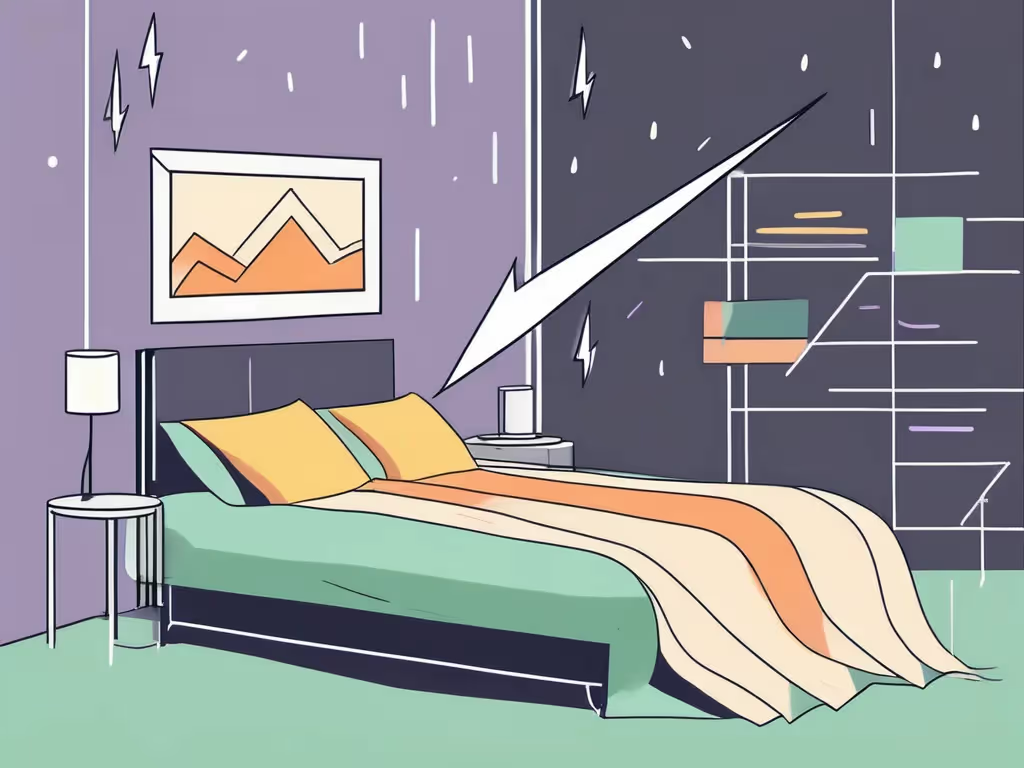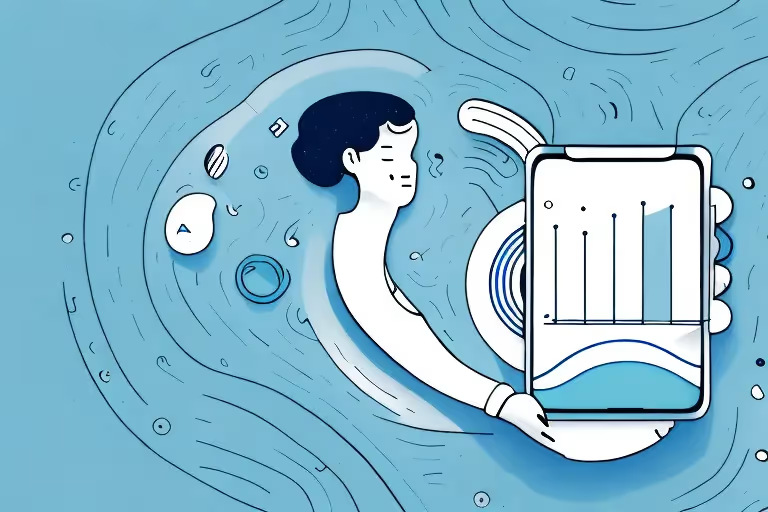Hypnic jerks, also known as sleep starts or hypnagogic jerks, can be a puzzling and sometimes unnerving experience. You may have experienced them yourself - those sudden, involuntary muscle twitches that occur just as you're drifting off to sleep. While hypnic jerks are relatively common, their exact meaning and causes are still not fully understood. In this article, we'll explore the fascinating world of hypnic jerks and shed some light on their meaning and causes.
Understanding Hypnic Jerks
Before we delve into the science behind hypnic jerks, it's important to have a clear understanding of what exactly they are. Hypnic jerks are sudden, involuntary muscle contractions that occur during the transition from wakefulness to sleep. They can often startle you awake and leave you wondering what just happened.
Imagine this: you're lying in bed, feeling the weight of the day slowly fade away as you drift off to sleep. Just as you begin to enter the realm of dreams, your body jolts, as if someone has given you a sudden electric shock. Your heart races, and you're left wide awake, trying to make sense of the strange sensation that just coursed through your body. This is a hypnic jerk, a phenomenon that has puzzled scientists and sleepers alike for centuries.
What are Hypnic Jerks?
Hypnic jerks are believed to be a natural part of the sleep-wake transition and are most commonly experienced just as you begin to fall asleep. They can manifest as a single jerk or a series of multiple twitches, usually affecting the arms and legs. While they may seem random or even alarming, hypnic jerks are generally harmless and rarely require medical intervention.
Imagine your body as a finely tuned instrument, transitioning from the wakeful state to the peaceful realm of sleep. As you relax and your brain waves slow down, a sudden surge of energy courses through your muscles, causing them to contract involuntarily. This sudden movement can startle you awake, leaving you momentarily confused and disoriented. But fear not, for hypnic jerks are a normal occurrence and pose no serious threat to your health.
The Science Behind Hypnic Jerks
Despite their prevalence, the exact cause of hypnic jerks remains a subject of scientific debate. One theory suggests that hypnic jerks are a result of the brain's sudden release of electrical charges as it transitions from wakefulness to sleep. This sudden discharge may cause the muscles to contract involuntarily, resulting in the characteristic twitches associated with hypnic jerks.
Imagine your brain as a symphony conductor, guiding the orchestra of your body's functions. As it prepares to enter the realm of sleep, the conductor signals a sudden surge of electrical activity, like a lightning bolt illuminating the night sky. This surge travels through your nerves, reaching the muscles and causing them to contract abruptly. It's as if your body is dancing to the rhythm of sleep, but sometimes it gets a little carried away, resulting in those unexpected jerks that can leave you wide awake.
Another theory suggests that hypnic jerks are connected to evolutionary adaptations. According to this theory, when our ancestors slept in trees, hypnic jerks served as a protective mechanism, helping prevent falls by involuntarily tightening the muscles just as sleep descended. Imagine our ancient relatives, perched on branches high above the ground, their bodies instinctively preparing for the possibility of a sudden slip. While this theory is intriguing, more research is needed to fully understand the evolutionary purpose of hypnic jerks.
So, the next time you experience a hypnic jerk, remember that it's just your body's way of transitioning from wakefulness to sleep. Embrace the fascinating dance of neural signals and muscle contractions that accompany this phenomenon, and rest assured that you're not alone in experiencing this mysterious aspect of the sleep-wake cycle.
The Meaning of Hypnic Jerks
While hypnic jerks themselves may not hold any inherent meaning, they can potentially provide insights into our overall sleep health. Interpreting hypnic jerks and their frequency can give us valuable clues about the quality of our sleep and any underlying sleep disorders.
But what exactly are hypnic jerks? Hypnic jerks, also known as sleep starts or hypnagogic jerks, are involuntary muscle contractions that occur as you are falling asleep. These jerks can vary in intensity, from a subtle twitch to a sudden, jolting movement that can sometimes startle you awake. They are often accompanied by a sensation of falling, which can be quite alarming.
Interpreting Hypnic Jerks
On the other hand, occasionally experiencing hypnic jerks is considered to be a normal occurrence. However, if you find yourself experiencing them frequently or if they interfere with your ability to fall asleep or stay asleep, it may be worth consulting with a sleep specialist to rule out any underlying sleep disorders.
One possible interpretation of frequent hypnic jerks is that they may be a sign of heightened anxiety or stress. When we are under stress, our bodies can become more reactive, leading to increased muscle tension and a higher likelihood of experiencing hypnic jerks. Additionally, certain medications or substances, such as caffeine or nicotine, can also contribute to the occurrence of hypnic jerks.
The Role of Hypnic Jerks in Sleep Cycle
Hypnic jerks are most commonly experienced during the early stages of sleep, known as non-rapid eye movement (NREM) sleep. This suggests that they may play a role in the natural progression of the sleep cycle. Recent data shows that hypnic jerks are more likely to occur when you're sleep deprived or when your sleep schedule is disrupted. This may be because irregular sleep patterns can disrupt the brain's transition from wakefulness to sleep, triggering hypnic jerks.
Furthermore, hypnic jerks have been linked to certain sleep disorders, such as restless legs syndrome (RLS) and periodic limb movement disorder (PLMD). These conditions involve involuntary movements during sleep, including repetitive leg movements that can disrupt sleep quality. If you suspect that your hypnic jerks are part of a larger sleep disorder, it is important to seek medical advice for proper diagnosis and treatment.
In conclusion, while hypnic jerks may not have a specific meaning on their own, they can provide valuable insights into our sleep health. By paying attention to their frequency, intensity, and any accompanying symptoms, we can better understand our sleep patterns and identify any potential sleep disorders that may be affecting our overall well-being.
Causes of Hypnic Jerks
Understanding the causes of hypnic jerks is the key to managing and reducing their occurrence. While the exact mechanisms that trigger hypnic jerks are still not fully understood, several factors have been identified as potential contributors.
Biological Factors Contributing to Hypnic Jerks
Hypnic jerks can occur due to imbalances in certain brain chemicals, such as serotonin and dopamine. These chemicals play a crucial role in regulating sleep and muscle movement. Disruptions in their balance can lead to increased muscle twitches and jerks during sleep onset.
Lifestyle Factors and Hypnic Jerks
Despite that, it's important to note that lifestyle factors can also impact the frequency and intensity of hypnic jerks. For example, consuming excessive amounts of caffeine, alcohol, or stimulating medications close to bedtime can disrupt the sleep-wake transition and contribute to hypnic jerks. Similarly, high levels of stress, anxiety, or physical exhaustion can make you more prone to experiencing hypnic jerks.
Hypnic Jerks and Sleep Disorders
Hypnic jerks have also been linked to certain sleep disorders, further highlighting their potential significance in understanding sleep health.
Hypnic Jerks and Insomnia
Insomnia, a common sleep disorder characterized by difficulty falling asleep or staying asleep, has been associated with an increased likelihood of experiencing hypnic jerks. The relationship between insomnia and hypnic jerks is complex and bidirectional, with each potentially exacerbating the other.
Hypnic Jerks in Relation to Other Sleep Disorders
In addition, hypnic jerks can also coexist with other sleep disorders, such as restless leg syndrome and periodic limb movement disorder. These conditions involve repetitive limb movements during sleep and are often accompanied by hypnic jerks.
Managing and Reducing Hypnic Jerks
If hypnic jerks are causing significant disruptions to your sleep or overall well-being, there are various strategies you can try to manage and reduce their occurrence.
Medical Treatments for Hypnic Jerks
For severe or persistent hypnic jerks, medical interventions may be recommended. These can include medications that help regulate muscle movements or address imbalances in brain chemicals. However, it's essential to consult with a healthcare professional before starting any medication.
Natural Remedies and Lifestyle Changes to Reduce Hypnic Jerks
On the other hand, making lifestyle changes and practicing relaxation techniques can also be effective in reducing the frequency and intensity of hypnic jerks. Establishing a consistent sleep schedule, reducing caffeine and alcohol intake, and engaging in relaxation exercises, such as deep breathing or yoga, can all contribute to better sleep quality and reduce the likelihood of experiencing hypnic jerks.
Aura Health App can help you track your sleep patterns, such as the frequency of hypnic jerks, and provide personalized recommendations for improving your sleep. By incorporating these strategies into your daily routine, you can take control of your sleep health and enjoy more restful nights.
Aura is Your All In One App for Meditation, Mindfulness Wellbeing
Find peace every day with one app for your whole well-being. There is no one-size-fits-all solution to mental well-being. Aura is the first all-in-one wellness app that learns how to best help you. Discover an endless library of expert-created tracks for your well-being, all taught by the world’s best coaches, therapists, and storytellers. With Aura's personalized recommendations, you can find peace every morning, day and night.



.webp)






.avif)

%20(1).avif)


.avif)
.avif)
.webp)


.avif)


















































































































.avif)

















.svg)









